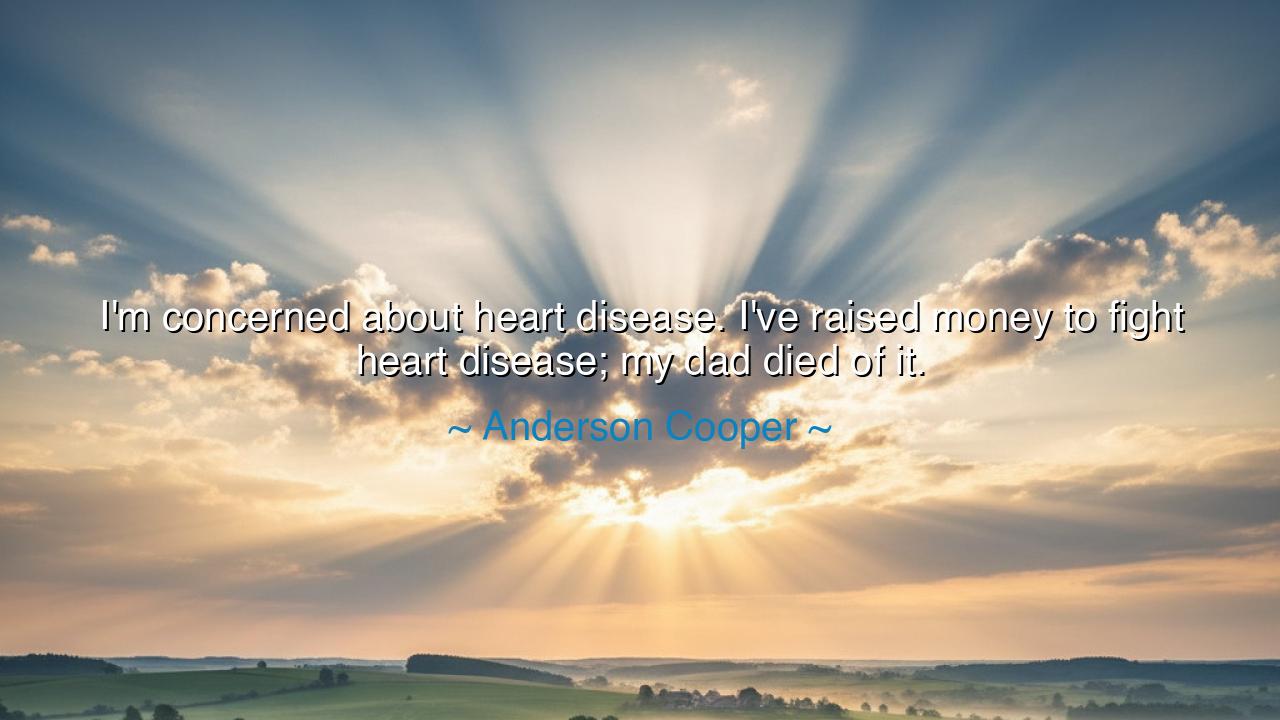
I'm concerned about heart disease. I've raised money to fight
I'm concerned about heart disease. I've raised money to fight heart disease; my dad died of it.






“I'm concerned about heart disease. I've raised money to fight heart disease; my dad died of it.” Thus spoke Anderson Cooper, the journalist whose calm voice has carried the weight of the world’s sorrows, and whose own heart carries the echo of personal loss. In this simple statement lies not merely grief, but transformation — the alchemy by which pain becomes purpose. For Cooper, the death of his father was not only an ending but a summons — a call to action, to ensure that others might be spared the same sorrow. Through his words, we are reminded that the wounds of the heart need not end in despair; they may become the wellspring of compassion and courage.
This quote is born of tragedy, for Anderson Cooper’s father, Wyatt Cooper, passed away in 1978 from heart disease when Anderson was but a child. It was a loss that carved deeply into his spirit. Yet, as with all great souls, he did not allow grief to harden him into bitterness. Instead, he took up the mantle of his father’s memory and turned sorrow into service. By raising money and awareness for the fight against heart disease, he transformed a private pain into a public mission — showing that true love endures not only in memory but in action. In his concern, there is both tenderness and resolve: tenderness toward what has been lost, and resolve to protect what remains.
Such is the ancient rhythm of human virtue: from loss arises purpose, from pain arises strength. The great philosopher Seneca once wrote that adversity does not destroy the soul; it reveals it. And in this, Cooper stands as a living testament. Many men and women suffer and fall silent, their grief buried beneath the weight of resignation. But others — the rare ones — let their sorrow become the forge of empathy. They understand that personal tragedy can be a bridge to collective healing. To mourn is human; to rise from mourning in service to others is divine.
Throughout history, we have seen this sacred transformation repeated. When Clara Barton witnessed the suffering of soldiers in the American Civil War, she could not bear to stand idle. Her compassion, born of seeing too much death, gave birth to the American Red Cross — an institution that has saved millions. Similarly, Anderson Cooper, through his work and advocacy, reminds us that journalism, philanthropy, and even personal awareness can become acts of redemption. To face the specter of one’s own family’s affliction and respond not with fear but with purpose is an act of quiet heroism.
Yet, Cooper’s quote speaks not only to activism but to something deeper: the inheritance of mortality. When he says, “My dad died of it,” he acknowledges the inescapable chain that links generations — the fragility passed from father to son, from ancestor to heir. In this recognition lies a profound humility. It is a reminder that power, fame, and intellect offer no shield against the laws of the body. We are all bound by the same mortal thread, and in acknowledging this, we rediscover our shared humanity. The great equalizer of illness humbles even the mighty, teaching compassion for all who suffer its touch.
But the quote carries another layer of wisdom: the duty to act upon awareness. Concern without action is sentiment; concern that moves the hands and heart is virtue. By choosing to raise funds and lend his voice to the cause, Cooper models a principle older than civilization itself — that of service. The ancients taught that to live well is to live in harmony with others, to leave the world better than one found it. So too does Cooper’s response reflect this timeless truth: that every loss can become a seed of hope, every heartbreak a light for those still wandering in darkness.
And so, my children, learn from these words what it means to turn grief into greatness. Let the sorrows you inherit not imprison you, but propel you toward compassion. When you lose, do not simply lament — build. When you see suffering, do not simply weep — act. The heart, though fragile, is also the most powerful engine of creation. It can break, yes, but it can also ignite the will to heal the world.
For as Anderson Cooper teaches through his own journey, the greatest memorial we can give to those we love is not in stone or monument, but in deeds of mercy and purpose. The heart that suffers can also save. So when you find yourself pierced by loss, remember this: you stand among the ancients who turned their grief into strength. Let your compassion become your legacy, your pain your offering. For in the end, it is not death that defines us, but what we choose to do with the love that remains.






AAdministratorAdministrator
Welcome, honored guests. Please leave a comment, we will respond soon